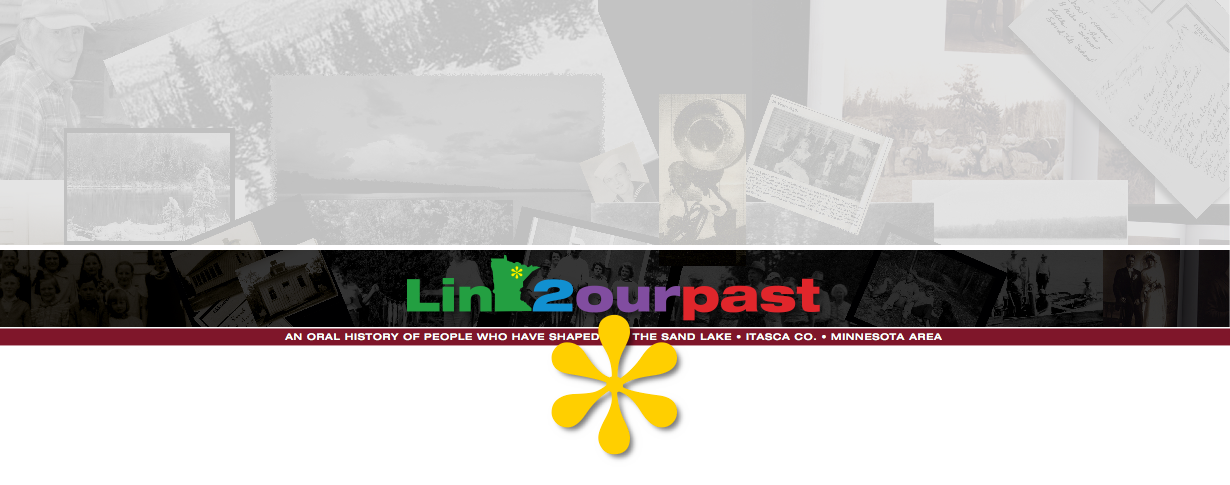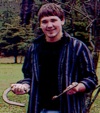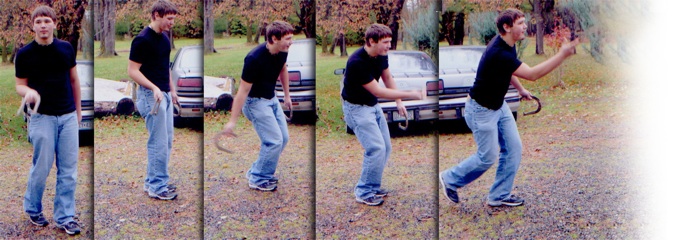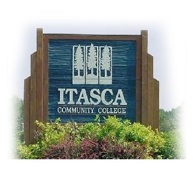Matt Korpela
Horseshoe Champion


Matt Korpela
Horseshoe Champion


By Bernie Troje
Before sunset when they started strumming their guitars, cowboys, perhaps a bit bored, might have tossed a few horseshoes. Wherever it started has come a game and competition on the state and national levels. Also, our own local champion.
Meet Matt Korpela, an unassuming young man you’d be proud to call your son.
For a nineteen year old, he’s quite mature. He has solid traditional values he seems to live by. He laughs easily, and though he has lots to boast about, he doesn’t. But he does know why he’s been successful and how he plans to use his success in his life and education. Indeed, he’s able to articulate all this quite well for someone who’s just graduated from high school.
You may know that in 2005 Matt at the age of fifteen won the World Championship in horseshoe competition. It turns out he likes to be challenged by anything that requires concentration, and he’s applied this skill to horseshoe competition and engineering courses at Itasca Community College. What is usually a diversion for older men at family picnics has had a profound impact on this young man’s life.
His first World was in 2001 in Hibbing. Competing in Class I, he and Daryl Carlson, his partner, took third. For years, the two, along with Wilfred Korpela, Matt’s father, and Gerald Stangland practiced at Cedar Lake horseshoe club.
Matt’s father and Stangland have pitched horseshoes together for years. At the age of six or seven, as Matt watched them, his dad asked him if he wanted to learn the “nicks.” May says, “It took me two years to get a complete ‘grip’.” That includes such things as step speed, the strength and speed with which you pitch, and the clincher, keeping your eye on the peg. From the years of practice, Matt’s footprints are engraved in the lawn of his backyard court.
Horseshoes vary in weight from two pounds six ounces to two pounds twelve ounces. They have a three inch gap tip to tip and are balanced in the middle. The metal can be “dead soft,” bendable and cushioning; “medium soft,” longer lasting; and “dead hard.” One shoe that isn’t the typical horseshoe design is the “ringless single,” a giant hook on one tip and no hook on the other. Most players use the Diamond shoe which cost $30.00 and up. Matt tosses a Ted Allen horseshoe. He buys a new pair each season for about $60.00 to $70.00. The Ted Allen is named for the world champion from the 1930’s.

Wilbur Wright was sitting at the table during Matt’s interview, and coincidentally, in the 1930’s, he lived down the street from Ted Allen in Boulder, Colorado. He was aware of Allen’s prominence in the sport, and he actually shook Allen’s hand. Matt was completely blown away by this. The trophy trailer set up at competitions displays Ted Allen’s long career as a horseshoe champion. Matt’s been through the trailer many times.
The horseshoe court Matt competes on is clay, according to regulations. Other courts are sand. To him the surface makes no difference. In fact, Matt isn’t even concerned about whether or not he has a home field advantage. The courts have two pegs either thirty or forty feet apart in six by three foot boxes. Next to them are the cement pads for players. Juniors under eighteen and elders over sixty pitch at thirty feet. Adults at forty. Matt won world as a junior and has had to adjust as an adult, initially over-throwing horseshoes as he made the transition.
Stangland, now 60, who lives on Little Sand in the summer and has been Matt’s partner, has become an elder as Matt has become an adult.
Matt’s sister Nicole has kept a scrapbook of his horseshoe competition. Besides winning world in Bakersfield, California in 2005, he took third in his class in 2001 (or 2000?) in the Hibbing tournament. That was junior competition. His entry average was pitching 19% ringers, but he pitched 40% in the competition.
World is held mid-July to early-August. State follows in early September. Ever since he was twelve, Matt has gone to every state and world competition. Matt’s not sure why, but horseshoe competition is much greater in Minnesota.
The state tournament is held in Genola, a twin city to Pierz, on Highway 25 south of Brainerd. It lasts two to four days and draws about one hundred competitors. Usually two to three hundred spectators attend. Matt, his father, Stangland, and Carlson go down the day before and practice all night. Stangland has been entrusted with the key to the building with the courts. Matt says, “I’m not gonna lie. It’s really fun.”
In Bakersfield they had an actual stadium for the competition. World’s a round robin tournament that lasts two weeks. Everyone plays each other, throwing so many shoes per game, all finishing about the same time. The best compete last. The 2007 World was in Hardmore, Oklahoma. Matt and his father stay in a tent in a campground near the tournaments.
Matt doesn’t train off season, but starting late March, he practices two weeks straight. He said it usually takes thirty pitches “to get back into [the] groove. It’s the timing and release. Matt says, “The very second it [the horseshoe] leaves your hand, you’ll know if it’s a ringer. Your whole body will know it.”
Practice develops the skill. Learning to concentrate makes the difference between winning or not in competitions. Your opponent can, according to Matt “get inside [your] head” with a simple comment. His dad provided the distractions while Matt practiced, even to the extent of mooning him. He played most sports in high school but still feels “horseshoes is the hardest thing [he’s] worked at.” Horseshoes, he says, “is a mental game……. It’s you against yourself.”
Matt likes the challenge of concentrating. At Blackduck High School he had a rigorous science teacher who never gave the answer until every student had worked out the problem. He says, “The funnest time in high school…..was working on those problems.” The quality of his math and science courses, especially physics, taught him to focus. That has been the ideal preparation for not only his horseshow competition but also his engineering courses at ICC. He wants to major in aeronautical or mechanical engineering.
Horseshoe competition has also made Matt “more of a people person… [He] used to be a really shy young man.” He meets lots of people and competes mostly against older adults.
As a twelve or thirteen year old, “I tried hustling once,” Matt confessed. His friend Daryl and he showed up at a horseshoe tournament sponsored by Richie’s bar in Marcel. It was the beginning and end of his hustling career. At first the other guys were poking fun at him. In competition, however, Daryl “threw a double doll. I threw a double back,” Matt said. Someone in the crowd said, “Wait a minute!” But the game was over in twelve shoes.
Matt said, “They were definitely rather angry. You could tell by the snotty little side comments.” He and Daryl felt pretty bad about it afterwards. He says he probably won’t ever hustle again, especially at Richie’s. “I’m pretty sure they’re still angry,” Matt said.
Consistent with his distaste for hustling is his feeling that only a “dirty player” tries to dislodge an opponent’s ringer. His motto is “Don’t play dirty. Play fair.” He earns his twenty-one points playing by the rules.
Actually his pitch is an unorthodox reverse three-quarters. In world competition only six or seven players pitch this. [His uncle Eddy thought his reverse would keep him from being competitive.] What his dad hoped to teach him was the conventional one-and-a-quarter turn. These styles refer to turns the shoe makes in the air. With this one exception of Matt’s individuality, he was his dad’s student. “Not to gloat,” says Matt, “My dad got [me] to the point where he couldn’t beat me…. I think he beat me once this year [2007], maybe twice last year, and three times the year before.”
Matt’s perfected his technique: the timing of his release; the low trajectory of the shoe (the horseshoe sometimes brushes his own shoe), and, of course, the concentration which shuts out the distractions in competition. Matt says, “The very second it leaves [my] hand I’ll know if it’s a ringer….. It’ll make the same sound every time it hits.” Before the state tournament he practices all night.
Matt participates in the world and state tournaments each year. The state is two to three days, and he throws one hundred shoes a day. The world lasts two to three weeks with hundreds of participants and two to three thousand spectators. Asked whether the world has a big purse, he said, “Oh no, Dude, you just about have to do it for fun.” It was $1,000.00 the year Matt took first. He wishes someone would offer one million dollars for a forty shoe perfect game. This, he feels, would attract more competitors, spectators, and coverage. Though some efforts have been made, horseshoes is not an Olympic game yet. Matt said very few Chinese participate in the competitions.
And, of course, there’s school. A bureaucratic snafu at ICC kept Matt from getting a room his freshman year in the engineering dorm, but he’s very happy with his off-campus apartment and roommates, none of whom is a student and all are older. “They’re awesome,” he says. It doesn’t bother him that they’ve been known to wake him up to talk when they come home from a late night of partying. His engineering advisor loaded him up with classes. Some days begin at 9:00 a.m. and end at 9:00 p.m. In addition to his engineering classes, he’s taking philosophy and sociology.
Matt credits his horseshoe competition with a long list of achievements. It’s helped him “adjust” an anger problem he once had. It’s made him more a people person. Because of his first place in world, he says, “All these people [he doesn’t know] come up to me and talk to me. I’d always get all red [in front of people].” He meets lots of people now, competes against mostly older adults, and even enjoys his celebrity. Horseshoes has certainly been an integral part of Matt’s life. Because of it, he’s closer to his family; he has a network of adult friends; and his ability to focus, to concentrate, continues to help him do well in his courses. The aspiring student he has become attests to his hard work, his enthusiasm for taking on challenges, and, indeed, his awareness of how his skills and talents can best serve him. His self-assurance means some day he’ll be an aeronautical engineer. And, of course, Matt Korpela’s plans certainly include continued participation in horseshoe competition on all levels.

“Dude,
I’m Not Gonna Lie to You.”
Horseshoes, he says, “is a mental game…….
It’s you against yourself.”



...taught him to focus.
That has been the ideal preparation for not only his horseshow competition but also his engineering courses at ICC. He wants to major in aeronautical or mechanical engineering